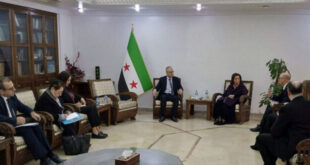Damascus, SANA – A two-day national workshop held by the Ministry of Education and the United Nations Children’s Fund (UNICEF) to discuss the priorities of 2016 strategy kicked off on Sunday.
Means of responding to the needs of the educational sector and the challenges facing the Ministry of Education, especially those prompted by the current crisis in Syria, are top on the workshop’s agenda.
The aim of the workshop is bridging gabs and presenting suggestions and solutions to overcome arising obstacles, with special focus placed on addressing the urgent education-related needs of terrorism affected children and adolescents.
Minister of Education Hazwan al-Waz addressed the workshop in a speech in which he underlined the importance of cooperation and coordination and sharing responsibilities to handle the educational
issues and problems.
He highlighted the need for having such workshops and meetings held regularly as they help in laying the bases and principles of cooperation with the international bodies to guarantee the students’ right to learn, and consequently developing the human resources.
For her part, the UNICEF Resident Representative in Syria Hanaa Singer said before the current crisis, Syria had achieved high standards in education with a school enrollment rate of over
99%. 
She added that the crisis reflected badly on the education sector in Syria, increasing dropouts and causing low enrollment rates, in addition to the number of schools going out of service and students and teachers suffering psychological problems due to the terrorists’ attacks.
Singer referred to the UNICEF campaign, carried out in cooperation with the Ministry of Education and its partners, to bring as many children as possible back to school, targeting 2.2 million children directly.
She also cited raising societal awareness campaigns that have targeted about 5.3 million people.
As for new programs, the UNICEF representative cited the self-education and alternate curriculum programs that are expected to benefit 700,000 Basic Education children by the end of 2015, in addition to programs for supporting 600 school clubs in various provinces.
Singer also referred to ongoing work to rehabilitate 600 schools targeting 300,000 children and to provide the Ministry of Education with 400 prefabricated classrooms to accommodate 300,000 children.
Last April, the Ministry of Education and the UNICEF signed a bilateral cooperation plan for the year 2015 that focuses on improving opportunities for student access to schools.
R.J/H. Said
 Syrian Arab News Agency S A N A
Syrian Arab News Agency S A N A




